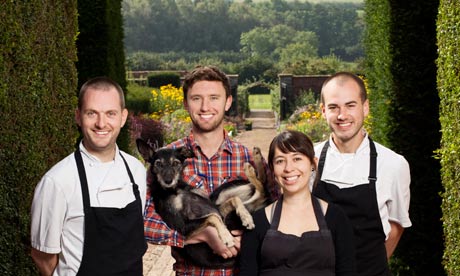
In 2010, four friends discovered a Victorian walled garden in the Mendip Hills, 10 miles outside Bristol, and decided it would make a perfect site for a restaurant. They renovated the two old greenhouses at the top of the garden and, instead of searching far and wide for suppliers, limited themselves to produce they could grow and whatever could be foraged, hunted and fished in the immediate area.
The Ethicurean has had a brilliant first couple of years – it was named best ethical restaurant by this magazine in 2011 and has just been awarded a Michelin Bib Gourmand. Their first cookbook is out next month, a testament to making the most of native ingredients and coping with the weather.
"Not only do you have the usual challenges of a restaurant, we've made our lives harder by saying that we are solely local and seasonal," say Paûla Zarate, who worked as a senior legal counsel before entering the food business. "This year has been incredibly difficult. Our apple crop has been a tenth of what it was in 2010."
Luckily, the kitchen sees such restrictions as a challenge. "Having all the ingredients in the world can actually be quite limiting, because there's too many options," says chef Iain Pennington, who runs the kitchen with his brother Matthew. "On the other hand, giving yourself boundaries can increase creativity."
The cookbook is full of inventive responses to their surroundings. Unable to grow oranges and lemons in the garden, the team found other ways of introducing acidity into dishes: cider vinegar and sea-buckthorn juice crop up in many of the recipes, as do coriander and sumac, which can be used as citrus alternatives.
"The book is about having a real connection with British food," says Jack Adair Bevan, who sometimes shoots game for the restaurant and is its resident mixologist. "The recipes come out of the land as much as a chef's head. So we're also looking at the history of our area – the local festivals and the pagan traditions and how those inspire what we eat. We've got a really interesting food culture and heritage here in Britain and that often gets overlooked."

